ORGANIC Coconut flour
partly de-oiled
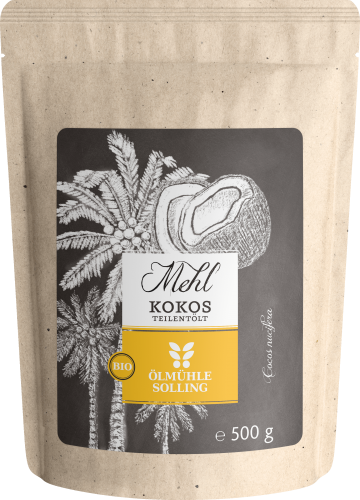

Non EU agriculture
- Organic coconut flour gently ground from coconut meat
- fine and sweet taste
- still contains approx. 18 g coconut oil per 100 g
- a valuable source of protein and fiber
- in light-protected and resealable packaging
- for baking and as an additive for smoothies and shakes
from 771 ratings
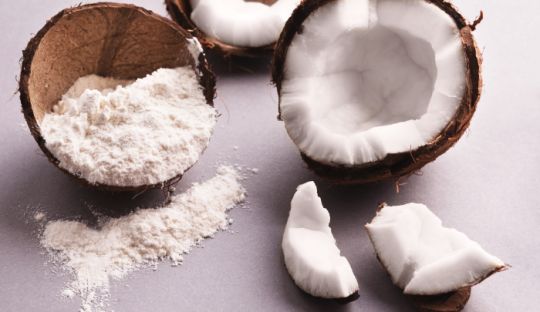 Coconut flour has a naturally sweet aroma and taste.
Coconut flour has a naturally sweet aroma and taste.Our organic coconut flour is obtained from the flesh of the ripe coconut. This is gently dried after harvesting, de-oiled by mechanical pressing and then ground.
The advantages of coconut flour compared to wheat flour are manifold. The exotic and typical coconut taste is particularly striking. Coconut flour is rich in protein and fiber and is gluten-free. For this reason, it is also suitable for a variety of low carb recipes.
Coconut flour is rich in fiber
The fiber content of around 35 g per 100 g in coconut flour is remarkably high. The sweet-smelling flour therefore has a high swelling capacity and binds a lot of water. The coconut oil content is reduced to 18 g through the pressing process. The carbohydrate content is 21 g and the protein content is approx. 17 g per 100 g.
Cake and waffle batter can be prepared perfectly with coconut flour. Around a quarter of the cereal flour can be replaced by coconut flour in almost any recipe. Thanks to its sweet taste, less sugar can sometimes be used than specified in the recipe. Our organic coconut flour is also a natural source of potassium. The potassium content (approx. 1750 mg per 100 g) is seven times higher than the sodium content. The minerals account for a total of around 5 g per 100 g of flour.
Coconut flour is suitable for a variety of recipes and is an excellent ingredient in protein shakes. It gives shakes with hemp protein a sweet, exotic taste and a firmer texture.
Waffles, cookies and cakes with coconut flour
Coconut flour gives baked goods such as waffles, cakes and cookies a delicate and typically exotic taste. The gentle coconut note also goes perfectly with pancakes and crêpes. Coconut waffles can be ideally combined with fresh fruit such as mango, raspberries or strawberries.
Coconut flour can replace some of the cereal flour in baking. However, as it does not contain gluten, the firmness of the dough can be supported by a natural thickening agent such as psyllium husk powder, gua gum or locust bean gum.
Usage
Botanical name: Cocos nucifera L.
Origin:
The coconuts for our coconut flour come from Sri Lanka.
Certification:
The coconuts used for our coconut flour come from Naturland producers from controlled organic cultivation in accordance with BIO VO 834/2007 and VO 1235/2008.
Recipe
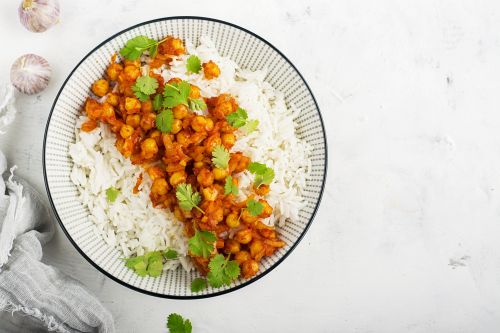
Chickpea curry with turmeric
Quick and easy recipe for curry with chickpeas and turmeric powder. Served with jasmine rice and seasoned with Garam Masala spice oil and coconut flour. zum Rezept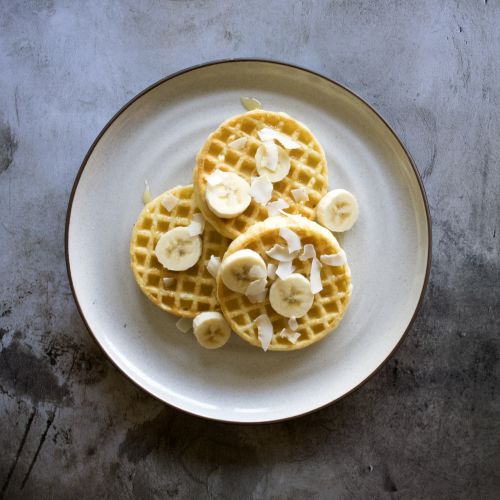
Coconut waffles
Recipe for delicious waffles with coconut flour, coconut oil, coconut milk and spelt flour. Quick and easy preparation. Serve with powdered sugar, fresh fruit or whipped cream. zum Rezept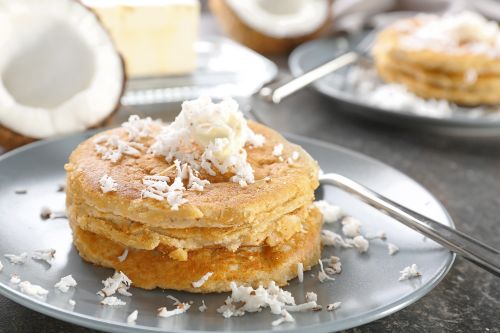
Pancakes with coconut flour
Simple recipe for pancakes with coconut flour and coconut oil. The cane sugar can be replaced with agave syrup. Sprinkle with coconut rasps before serving. zum Rezeptweitere Rezepte
Ratings
Specification and ingredients
Coconut flour
Average energy and nutrient content for 100 g
Please enjoy our products as part of a diverse and balanced nutrition.
As a product of nature the composition of the oil can vary, the given specifications are therefore average values.
Ingredients
Coconut flour, certified organic. May contain traces of almonds, hazelnuts, walnuts or sesame.Durability
6 - 9 monthsLagerung
Store in a cool and dark place.Botanical name: Cocos nucifera L.
Origin:
The coconuts for our coconut flour come from the Philippines.
Certification:
The coconuts used for our coconut flour come from producers from controlled organic cultivation in accordance with BIO VO 834/2007 and VO 1235/2008.





 Coconut butter
Coconut butter Coconut rasps
Coconut rasps Coconut flower sugar
Coconut flower sugar